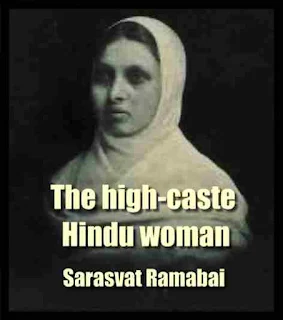The high-caste Hindu woman
Here, injustice to the author of " The High-Caste Hindu Woman," a statement should be made that she does not make. It is that in her citations from Manu, the great Hindu law-giver, she not only had at her command the best translations of the sacred texts but a thorough knowledge of the Sanskrit language which enabled her to make her own translations from the original.
On her return from England and America, in appreciation of her great learning, one of her countrymen paid her the following tribute: " Pandita Ramabai combines in herself what even in the men of India is a rare combination; deep knowledge of the Hindu Shastras and an intimate acquaintance with the inner life, thought and speech of the most advanced and civilized nations of the West.
For several centuries a lady Sanyasi so learned and so devoted to the elevation of her sex has not appeared on the stage of Indian life." Forty-three years ago, on the 23rd of April, 1858, in the forest of Gungamal, in the Western Ghats of India, a child was born, who as a woman was to stand forth alone, a fearless champion of the rights of her unfortunate sisters, to strike from them the chains of ignorance and superstition that for centuries have kept them in cruel bondage.
Her parents gave to her the name of the goddess Rama, which signifies "bright." Her father, Ananta Shas- tri, a learned Brahman, taking to himself an ignorant child-wife nine years of age, resolved to put in practice his liberal theories concerning female education. But so horrified were his people by this open disregard of the cherished traditions and customs of the country that he was obliged to make for himself and his little wife Lakshmi- bai a home in the forest, where he could teach her unmolested save by the wild beasts.
Her early memories of that home were of lying on the ground night after night, convulsed with terror by the cries of the beasts in the jungle, her husband sitting by her side to soothe her. Day by day the lessons went on; her gifted mind responded readily to her husband's teachings; in time she realized his fondest hopes, and became the teacher of the children who came to them. Ramabai's still vivid memories of the forest home are of being awakened at early dawn by a mother's tender caress, and of the early morning lessons learned only from her mother's lips and from Nature.
Not long after her birth, the life of the family became a wandering one, consisting of homes in forests, long pilgrimages, travelling from city to city, from town to town, often shelterless at night and hungry by day, the father still plead- ing fearlessly for the elevation of his countrywomen. Because of his advanced views concerning female education, and because he would not give his little daughter in marriage at the age of nine, he was virtually ostracized by his brethren.
During this time Ramabai's education went on; she learned to speak Marathi, Hindustani, Kanarese and Bengali and gained a wonderful knowledge of Sanskrit. After the death of the parents, which occurred during the great famine of 1877, Ramabai and her brother took up the work of the father. Ramabai's fame as a lecturer reached the ears of the pandits of Calcutta, they desired to hear and see for themselves.
She obeyed their summons to appear before them; so astonished and pleased were they by the clearness of her views, and her eloquence in presenting them, that they publicly conferred on her the highest title Sarasvati, Goddess of Wisdom. It was during these wanderings with her brother that Ramabai's faith in the Hindu religion was shaken though she continued the worship of idols until nearly twenty years old. Conversations with Keeshub Chunder Sen, with the books he gave her to read, enlightened her in regard to other religions, and in a great measure prepared her for the acceptance of Christianity some years later.
Although even at the time of her brother's death when left alone in the world, and again when overcome with grief by the sudden loss of her husband, she had a dim consciousness of being cared for by an Infinite Being who had no kinship with idols. In the pathetic account of her father's death, Ramabai says that he did not know the only true God, but served the to him, unknown God, with all his heart. His last words to her were, "
Contents:
Introduction, ' . 7
Prefatory Remarks, ....... 29
Childhood ... 40
Married Life ... 56
Woman's Place in Religion and Society, . . . 76
Widowhood, 95
How the Condition of Women Tells upon Society,. 119
The Appeal 131
the book details : Author:Sarasvat Ramabai Publication date:; 1901 Company: New York, Revell
Download 4 MB
Download 4 MB


